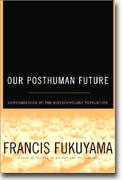Our Posthuman Future
Francis Fukuyama
book reviews:
· general fiction
· chick lit/romance
· sci-fi/fantasy
· graphic novels
· nonfiction
· audio books
· author interviews
· children's books @
curledupkids.com
· DVD reviews @
curledupdvd.com
newsletter
win books
buy online
links
home
for authors
& publishers
for reviewers


|
Our Posthuman Future: Consequences of the Biotechnology Revolution Francis Fukuyama Farrar Straus & Giroux Hardcover 272 pages April 2002  |
|
Unfortunately, despite an impressive survey of science and philosophy, and a thorough wringing of hands, the terrors Fukuyama raises are inadequately thought-through. We are left with a future that is not convincingly doom-ridden. Fukuyama believes that growing knowledge of the brain will permit dangerous manipulation. “Neuropharmacology” is one means. Prozac (for depressed girls) and Ritalin(for hyperactive boys) are on their way to androgynizing our youth. Selective serotonin reuptake inhibitors(SSRIs) ease adult worries. Do we want bland happiness replacing hard-edged creativity? he asks. Of course, drug treatment for mental disorders has emptied many “mad houses” and saved countless lives from despair and delusion. Its regulation is one of the major functions of parents, doctors,and various existing bureaucracies. To be fair, Fukuyama admits to some medical need for brain-altering drugs. And he proposes no new controls, only worries. Next, he agrees that soon microbiologists may extend life through the encouragement of DNA repair genes and the re-extension of chromosomes that shorten when cells replicate. However, he concentrates on the possibility that added years will be ones of disability rather than of rejuvenation. Recent experimenters report the end of senescence and the “maintenance of normal human cells in a phenotypically youthful state…” [See EXTENSION OF LIFE-SPAN BY INTRODUCTION OF TELOMERASE INTO NORMAL HUMAN CELLS by Andrea G. Bodnar et al in Science 16 January 1998.] Thus there are hopeful prospects for the beneficial extension of life. Of course science has a long way to go and many way stations to pass before it may cure all the effects of age in a single body. But we should not raise difficulties at this stage. Fukuyama is terrified by other changes to “human nature” that will be possible through genetic engineering. Women already are discarding those of their eggs with genetic disabilities, will soon select the fertilized egg that has the best characteristics, and, in a few more years,will have microbiologists actually design a child’s DNA. There will be an intelligence arms race, a convergence of characteristics, and “a loss of our humanity.” He reasons from an a priori assumption that there is a “human nature” which must be protected and tries to define the squishy term. He has a particular problem with facets of character. Women are “normally” more caring than men. Most societies deplore murder (unless it is of some other ethnicity). Parents protect children (except…). He flounders with specifying what he wants to save. The reader is mentally left with modifying the proposition once uttered by a Supreme Court judge: “I can’t define pornography [non-human character] but I know it when I see it.” Fukuyama desires the maintenance of accidental evolution, normal life spans, and biological stasis except for curative medical treatment. He has little faith in parental, medical, and governmental, case by case, good judgment. He would create a new regulatory agency in the United States and agitate for cooperative efforts by all countries. However, what great prophet would we appoint to manage a science whose eventual effects we can’t predict and which may impact on a humanness we can’t define? This writer would prefer a step-by-step,democratic approach. Lets only legislate against human cloning when we have a clear consensus that the practice is unhealthy for the children produced; against life extension when we know it only may extend a cruel disability; and against baby tailoring when more is understood of the genetic basis for character. Let’s leave scary futures and busybody alternatives to Science Fiction. © 2002 by Dean Warren for Curled Up With a Good Book |
|
|
|
 Click here to learn more about this month's sponsor! |
|
| fiction · sf/f · comic books · nonfiction · audio newsletter · free book contest · buy books online review index · links · · authors & publishers reviewers |
|
| site by ELBO Computing Resources, Inc. | |